John Hurrell – 16 August, 2023
In terms of meaning, we might wonder if Malevich's paradoxical title that Ingram appropriates (one of two, the other being Black Square and Red Square) is a sign that Malevich was being politically cautious, that he wanted to be seen promoting a worker/progressive agenda following from his previous folksy 'tubism'—and not a mystical avant-garde one—using a figurative narrative within Suprematism.
Auckland
Simon Ingram
Colour Masses in the Fourth Dimension
8 August 2023 - 26 August 2023
In this new show from Simon Ingram, we discover that he does not use his well-known robotic paint-application machine (that straddles the canvas and moves across it) that he can programme from his laptop. Instead, looking at the ten canvases at Gow Langsford, we see scattered irregular hand-made daubs—using thin paint. Sometimes with lots of in-between space. Apparently here he is trying to ‘think’ like a robot. Mimic a creative ‘art practising’ cybernetic.
There seem to be three varieties of painting: those that are less densely packed with such marks, that present ‘shaped’ white canvas as negative space; and those that have crammed together, compacted jostling blobs, no white, and a more easily perceived plethora of colour that has a patchwork on fabric quality. There is also however a third ‘middle’ variety with tiny white slivers separating brushstrokes.
The first (‘airier’) variety seems like a synthesis between camouflage patterns and (from a distance) the (torn paper) décollages of the French affichiste artists (like Raymond Hains and Jacques Villeglé) of the very late forties. Some of the negative spaces might lock in with the figurative title that serves as a catalyst, a generator of ‘gestalts’ that invite many interpretations. The marks are extremely varied.
The other extreme, the denser variety, has fragments of figuration, seemingly intended by Ingram, of a standing male figure-in separate pieces—perhaps with a canvas in a landscape. Or a dog in a bag. It hints at a mosaic version of Sandro Chia, for the marks are conspicuously regular. In the middle sort the marks are not tightly packed but have thin glowing edges. The marks float alongside each other. Butted up but loose.
In terms of meaning, we might wonder if Kazimir Malevich‘s paradoxical title that Ingram appropriates (one of two, the other being Black Square and Red Square) is a sign that Malevich was being politically cautious, that he wanted to be seen promoting a worker/progressive agenda following on from his previous folksy ‘tubism’—and not a mystical avant-garde one—using a figurative narrative within Suprematism.
Here the title for Malevich’s revolutionary abstraction of 1915, that Ingram uses, allows the possibility of narrative-suggesting shapes for the knapsack (big black square) and boy (lower smaller red square). If Malevich really believed the opposite (as stated) that he painted “energy” and not “the soul”, then the above interpretation is the latter not the former, erroneously dwelling in the visible and not the fourth dimension. And it doesn’t match Ingram’s long interest in the fourth dimension, which includes invisible radio waves.
Interestingly, Briony Fer, in her fascinating book, On Abstract Art, mentions in the chapter on Malevich (p. 10) that the playwright Bertolt Brecht loathed abstract art, claiming that it encouraged the viewer “to project meanings and fantasies” onto what was being examined. This he regarded as its Achilles’ heel.
In the exhibition notes that the gallery provides, Ingram links his new paintings with pareidolia, the ability to interpret chance data as evidence to support usually unforeseen narrative meanings. In the past, some of Ingram’s earlier shows have already been conducive to this.
My earlier observations about the French torn-poster school having similar properties to the airier (negative space) works, connects to shows of Ingram’s from October 2019 (paper images under glass) and September 2020 (canvas works) where incongruously separated elements magically (and inexplicitly) combined.
The pareidolia phenomena has been of interest to many artists and writers, ranging from Leonardo to William Burroughs. With the Ingram’s works that include a great many negative spaces there seems more likely to be a multitude of interpretative possibilities. Most of these (Nos. 9,10, 7 and 8) suggest a barely detectable figure, at times seated, with No.10 also suggesting trees and houses in a semi-cubistic tessellated landscape. We try to connect up the white ‘islands’.
Looking at the denser, more confusing, canvases we see instead that they revel in shattered floating isolated body parts on the verge of a flickering corporeal unity. (Nos.1, 2, 3, and 5). No.6 and 4 on the other hand (with slivered white edges) strongly hint at hovering house roofs in the landscape, with lots of mottled green, piercing orange and sometimes blue-grey.
Whilst some of Ingram’s other ‘pareidolia’ works are wilder in their fanciful reach, these play more into conventional art history that dwells on landscape, architecture and the human form, using ‘natural’ outdoor colours. They are a type of grid painting (one that is overtly reliant on language) that cunningly looks like plein air painting and torn posters—lacking the graphic complexity of say, the 2019 projects. More a stately Cézanne than a mangled Paolozzi.
John Hurrell
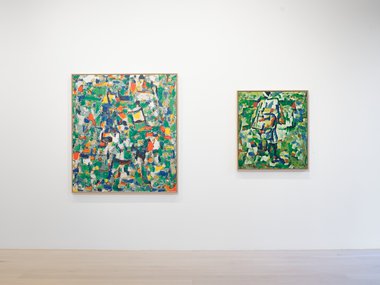
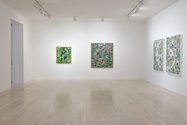
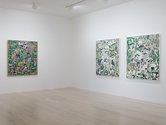

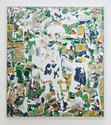
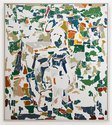
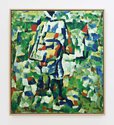
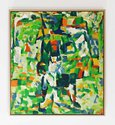
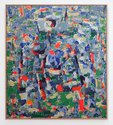
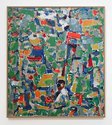
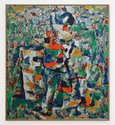
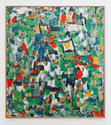
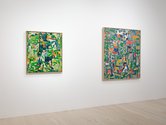
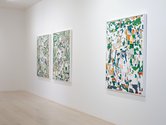
 Advertising in this column
Advertising in this column Two Rooms presents a program of residencies and projects
Two Rooms presents a program of residencies and projects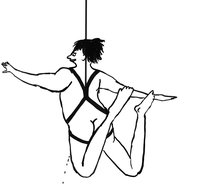
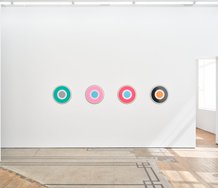
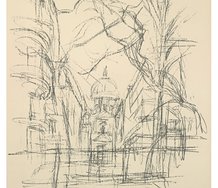
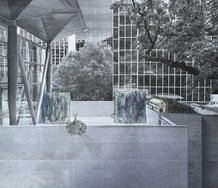
This Discussion has 0 comments.
Comment
Participate
Register to Participate.
Sign in
Sign in to an existing account.